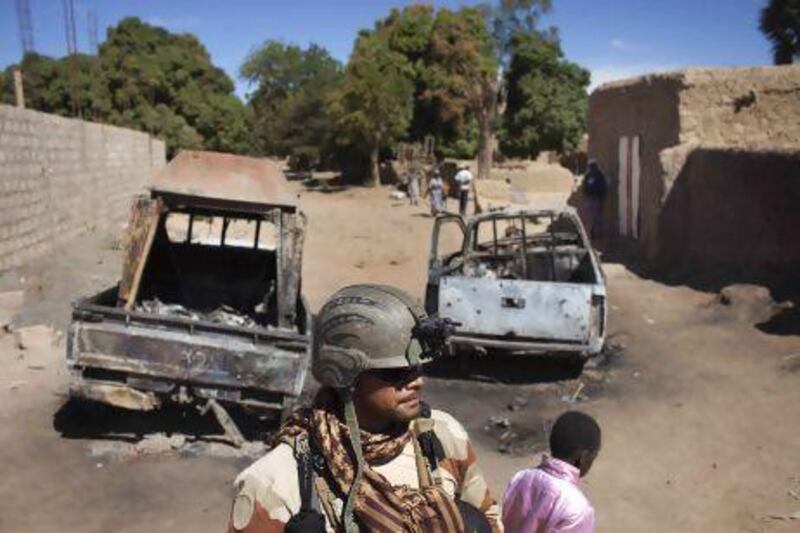DIABALY, MALI // Sitting beneath the charred mango tree in the courtyard of his mud house, Barnaby Dakouo, 63, remembers the moment the French planes came to destroy the jihadist fighters who took over his town.
In the very early hours of January 15, the day after this strategically located town had been taken over by extremist militants, there was a huge explosion. Shrapnel came flying through his bedroom wall, hitting him in the shoulder and his adult son in the leg.
Peering though their window they saw that an air raid had hit two pickup trucks mounted with heavy guns, killing two fighters. A fire was raging in their courtyard.
The family of 12 cowered together all night and fled to a nearby village the next morning, but when asked if they would rather the French had not conducted the air campaign, they broke into cries of demurral.
"If we were not bombed, they would have stayed here," said Mr Dakouo, referring to the extremists. "God save them, we thank God for saving our lives."
Just more than a week ago, this lakeside farming town in the lush, fertile countryside of central Mali, went abruptly from being a settlement of mud buildings, with a brick church and cinder-block mosque, to a front line of the battle for the control of this West African country between French-backed Malian troops and the ferocious fighters who pushed south from their northern strongholds.
Now with its football pitch draped in French and Malian flags and lined with armoured vehicles full of French and Malian soldiers, people in Diabaly are visibly relieved that their occupation by the radicals lasted less than a week.
But its sleepy streets bear scars, and some fear that their assailants could yet be hiding in the leafy expanses of the countryside.
"On Monday morning, we heard the rifles shooting, and then later saw three Land Cruisers," said Raphael Dembele, a Christian tailor who was in his shop at the time. Terrified of the reputation of the Al Qaeda-linked groups who imposed a harsh version of Sharia in the north, he tore off his shirt, which depicted Jesus Christ, borrowed another from a friend, and hurried home to his wife and children.
Just after he arrived, seven of the fighters entered his house, carrying a box of ammunition. Some were from the Tuareg people of the north, others were Arabs. He was petrified, but they had come to reassure him. "They told me not to be afraid, they only want white guys and soldiers," he said.
The fighters quickly overpowered Malian troops, who suffered many casualties, fled the town and did not return in force for days.
About five kilometres out of town, an armoured personnel carrier still holds the rotting bodies of three soldiers shot in the battle, with ransacked ammunition boxes scattered nearby.
Working fast, with dozens of pickup trucks mounted with heavy weapons, residents said that the groups took control and set up checkpoints on street corners.
While not imposing strict Sharia - some men said they were still allowed to smoke while others said women were told to cover up - they lectured people on Islamic law.
They also beat up a number of Christians, who residents said make up about 15 per cent of the population. A church was vandalised, the stone cross from the roof now lying chipped on the ground, and, inside, icons and paintings were damaged.
The rebels hid vehicles and ammunition caches under big trees in gardens and took over houses to sleep in.
Rokia Diallo said she fled her house when she heard the fighters had taken over her home and headed to a nearby village.
"I was afraid," she said. "I hope they don't come back."
On Friday, after five days of French air strikes - described as surgically precise - that incinerated vehicles and weapons stashes, the rebels left, heading to the border with Mauritania.
But both French and Malian soldiers advanced only tentatively into the town, fearing that rebels could be hiding among the local population.
Now, with French forces patrolling the streets, people say they feel safe for the first time.
"We don't want them to leave," said Muhammed Daouo, a farmer. "We are not at all at ease. They can easily come back."






